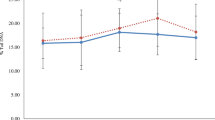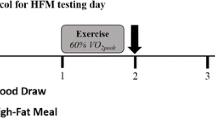Abstract
This study aimed to determine whether changes in plasma heparin-releasable lipoprotein lipase (LPL) activity following a brisk walk were associated with decreases in fasting and/or postprandial triglyceride (TG) concentrations. Two groups of pre-menopausal women participated. In one group (fasting study group, n=10), TG concentrations and post-heparin plasma LPL activity were measured in the fasted state on two occasions: ~18 h after a 2-h treadmill walk at 50% maximal oxygen uptake (exercise trial); and after a day of no exercise (control trial). The other group (postprandial study group, n=9) undertook two oral fat tolerance tests (blood samples taken fasting and for 6 h after a high-fat meal), with plasma LPL activity measured 6 h after meal ingestion. Pre-conditions were the same as for the fasting study group (i.e. control and prior exercise). Prior exercise reduced fasting TG concentrations by 23 (7)% (fasting study group) [mean (SEM)] and by 18 (9)% (postprandial study group) (both P<0.05), and the postprandial TG response by 23 (6)% (postprandial study group) (P<0.01). Plasma LPL activity was not significantly increased by exercise in either the fasting or postprandial study groups. However, exercise-induced changes in both fasting and postprandial LPL activity were significantly correlated with the respective exercise-induced changes in fasting TG concentration and the postprandial TG response (r=−0.70 and −0.77 respectively, P<0.05 for both). These data suggest that increased LPL activity may contribute to the hypotriglyceridaemic effect of moderate exercise, although other mechanisms are also likely to be involved.




Similar content being viewed by others
References
Borg GA (1973) Perceived exertion: a note on history and methods. Med Sci Sports 5:90–93
Cohn JS (1998) Postprandial lipemia: Emerging evidence for atherogenicity of remnant lipoproteins. Can J Cardiol 14:18B–27B
Durnin JVGA, Womersley J (1974) Body fat assessed from total body density and its estimation from skinfold thickness: measurements on 481 men and women aged from 16 to 72 years. Br J Nutr 32:77–97
Eckel RH (1989) Lipoprotein lipase. A multifunctional enzyme relevant to common metabolic diseases. N Engl J Med 320:1060–1068
Ferguson MA, Alderson NL, Trost SG, Essig DA, Burke JR, Durstine JL (1998) Effects of four different single exercise sessions on lipids, lipoproteins, and lipoprotein lipase. J Appl Physiol 85:1169–1174
Frayn KN Macdonald IA (1997) Assessment of substrate and energy metabolism in vivo. In: Draznin B, Rizza R (eds) Clinical research in diabetes and obesity, part I. Methods, assessment, and metabolic regulation. Humana Press, Totowa, N.J., pp 101–124
Frayn KN, Shadid S, Hamlani R, Humphreys SM, Clark ML, Fielding BA, Boland O, Coppack SW (1994) Regulation of fatty acid movement in human adipose tissue in the postabsorptive-to-postprandial transition. Am J Physiol 266:E308–E317
Gill JMR, Mees GP, Frayn KN, Hardman AE (2001a) Moderate exercise, postprandial lipaemia and triacylglycerol clearance. Eur J Clin Invest 31:201–207
Gill JMR, Frayn KN, Wootton SA, Miller GJ, Hardman AE (2001b) Effect of prior moderate exercise on exogenous and endogenous lipid metabolism and plasma factor VII activity. Clin Sci 100:517–527
Gill JMR, Herd SL, Tsetsonis NV, Hardman AE (2002) Are the reductions in triglyceride and insulin levels after exercise related? Clin Sci 102:223–231
Greiwe JS, Holloszy JO, Semenkovich CF (2000) Exercise induces lipoprotein lipase and GLUT-4 protein in muscle independent of adrenergic-receptor signaling. J Appl Physiol 89:176–181
Griffin BA (1999) Lipoprotein atherogenicity: an overview of current mechanisms. Proc Nutr Soc 58:163–169
Herd SL, Kiens B, Boobis LH, Hardman AE (2001) Moderate exercise, postprandial lipemia and skeletal muscle lipoprotein lipase activity. Metabolism 50:756–762
Jensen MD (1995) Gender differences in regional fatty acid metabolism before and after meal ingestion. J Clin Invest 96:2297–2303
Kiens B, Richter EA (1998) Utilization of skeletal muscle triacylglycerol during postexercise recovery in humans. Am J Physiol 275:E332–E337
Knapper JM, Puddicombe SM, Morgan LM, Fletcher JM (1995) Investigations into the actions of glucose-dependent insulinotropic polypeptide and glucagon-like peptide-1(7–36) amide on lipoprotein lipase activity in explants of rat adipose tissue. J Nutr 125:183–188
Malkova D, Evans RD, Frayn KN, Humphreys SM, Jones PR, Hardman AE (2000) Prior exercise and postprandial substrate extraction across the human leg. Am J Physiol 279:E1020–E1028
Nguyen TT, Mijares AH, Johnson CM, Jensen MD (1996) Postprandial leg and splanchnic fatty acid metabolism in nonobese men and women. Am J Physiol 271:E965–E972
Nilsson-Ehle P, Schotz MC (1976) A stable, radioactive substrate emulsion for assay of lipoprotein lipase. J Lipid Res 17:536–541
Nozaki S, Garg A, Vega,GL, Grundy SM (1991) Postheparin lipolytic activity and plasma lipoprotein response to omega-3 polyunsaturated fatty acids in patients with primary hypertriglyceridemia. Am J Clin Nutr 53:638–642
Pate RR, Pratt M, Blair SN, Haskell WL, Macera CA, Bouchard C, Buchener D, Ettinger W, Heath GW, King AC, Kriska A, Leon AS, Marcus BH, Morris J, Paffenbarger RS, Patrick K, Pollock ML, Rippe JM, Sallis J, Wilmore JH (1995) Physical activity and public health. A recommendation from the Centers for Disease Control and Prevention and the American College of Sports Medicine. JAMA 273:402–407
Rebuffe-Scrive M, Enk L, Crona N, Lonnroth P, Abrahamsson L, Smith U, Bjorntorp P (1985) Fat cell metabolism in different regions in women. Effect of menstrual cycle, pregnancy, and lactation. J Clin Invest 75:1973–1976
Sady SP, Thompson PD, Cullinane EM, Kantor MA, Domagala E, Herbert PN (1986) Prolonged exercise augments plasma triglyceride clearance. JAMA 256:2552–2555
Seip RL, Angelopoulos TJ, Semenkovich CF (1995) Exercise induces human lipoprotein lipase gene expression in skeletal muscle but not adipose tissue. Am J Physiol 268:E229–E236
Seip RL, Mair K, Cole TG, Semenkovich CF (1997) Induction of human skeletal muscle lipoprotein lipase gene expression by short-term exercise is transient. Am J Physiol 272:E255–E261
Taylor HL, Burskirk E, Henschel A (1955) Maximal oxygen uptake as an objective measure of cardio-respiratory fitness. J Appl Physiol 8:73–80
Thomas TR, Horner KE, Langdon MM, Zhang JQ, Krul ES, Sun GY, Cox RH (2001) Effect of exercise and medium-chain fatty acids on postprandial lipemia. J Appl Physiol 90:1239–1246
Weintraub MS, Zechner R, Brown A, Eisenberg S, Breslow JL (1988) Dietary polyunsaturated fats of the W-6 and W-3 series reduce postprandial lipoprotein levels. Chronic and acute effects of fat saturation on postprandial lipoprotein metabolism. J Clin Invest 82:1884–1893
Wendler D, Michel E, Kastner P, Schmahl FW (1992) Menstrual cycle exhibits no effect on postprandial lipemia. Horm Metab Res 24:580–581
Westphal S, Orth M, Ambrosch A, Osmundsen K, Luley C (2000) Postprandial chylomicrons and VLDLs in severe hypertriacylglycerolemia are lowered more effectively than are chylomicron remnants after treatment with n-3 fatty acids. Am J Clin Nutr 71:914–920
Yost TJ, Jensen DR, Haugen BR, Eckel RH (1998) Effect of dietary macronutrient composition on tissue-specific lipoprotein lipase activity and insulin action in normal-weight subjects. Am J Clin Nutr 68:296–302
Zhang JQ, Thomas TR, Ball SD (1998) Effect of exercise timing on postprandial lipemia and HDL cholesterol subfractions. J Appl Physiol 85:1516–1522
Acknowledgements
This work was supported by the British Heart Foundation. The authors are grateful to Dr. Jacky Knapper and Dr. Catriona Brooks of the School of Biological Sciences, University of Surrey for advice with the assay for determining LPL activity. We also thank Dr. Mike Morgan of Glenfield Hospital, Leicester for help with data collection. The experiments undertaken in this study comply with current UK laws.
Author information
Authors and Affiliations
Corresponding author
Additional information
An erratum to this article is available at http://dx.doi.org/10.1007/s00421-003-0827-1.
Rights and permissions
About this article
Cite this article
Gill, J.M.R., Herd, S.L., Vora, V. et al. Effects of a brisk walk on lipoprotein lipase activity and plasma triglyceride concentrations in the fasted and postprandial states. Eur J Appl Physiol 89, 184–190 (2003). https://doi.org/10.1007/s00421-002-0788-9
Accepted:
Published:
Issue Date:
DOI: https://doi.org/10.1007/s00421-002-0788-9




